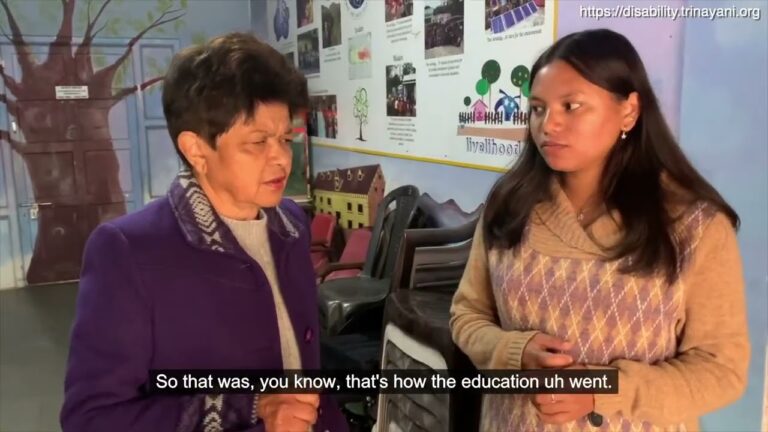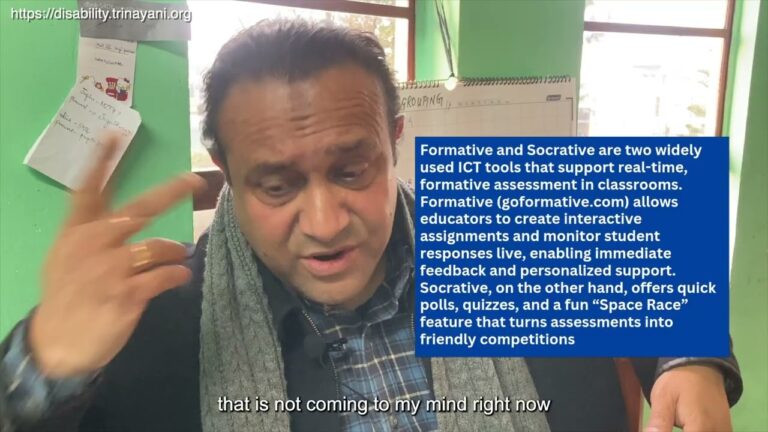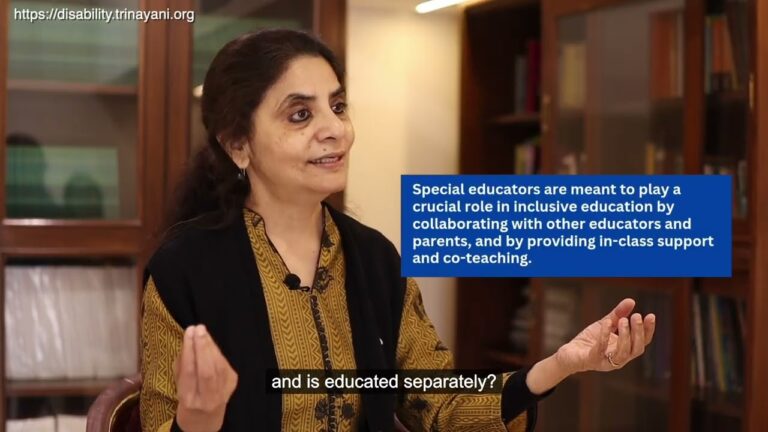Stories of change through PILs
Subhash Chandra Vashishth is a dedicated advocate with expertise in disability rights. He manages www.disabilityrightsIndia.com, a comprehensive repository of case laws. He actively litigates in various courts across India, working tirelessly to restore the rights of disabled citizens.
In this video he delves into various Public Interest Litigations (PILs) filed by self-advocates and others in the realm of disability, addressing crucial issues in sectors such as education, transportation and the workplace etc.
What is the major PIL that was registered to give vacant seats to non-benchmarked disabilities in the education sector?
PILs as people know it is Public Interest Litigation, Janhit Yachika we call it, and these are very important tools in the hands of citizens of the country to take up issues that affect larger society, in our case especially persons with disabilities.
Constitution has been a major anchor for all of us.
The Persons with Disabilities Act come much much after, earlier there was the 1995 Act under which there were a lot of PILs filed, then there was an act in 2016 which was brought into implement the UN Convention of Rights of Persons with Disabilities in the country.
So, under both laws there had been PILs.
So PILs typically are on issues of equality, that, equal treatment is not meted out to persons with disabilities and in the process we find, PILs are also filed on lack of implementation of certain sections or interpretations of those sections correctly and in which court’s interpretation really helps, in implementing that law for larger benefit of society.
So section 32 of the Rights of Person with Disabilities act provides for 5% reservation in higher education.
But this is for benchmark disabilities.
Most of these special concessions or reservations are meant only for persons with benchmark disabilities;
And I’m sure by now everybody knows benchmark disabilities are 40% or above specified, of specified disability.
Now recently, looking at the experience, a lot of seats were going vacant because not sufficient number of people were there to fill up these benchmark seats reserved for benchmark disabilities in educational institutions, universities and higher learning centers.
So recently a case has been filed in the Delhi High Court.
In the process what we found was a lot of people not with benchmark disabilities, but persons with disabilities who have been defined in the law as persons with disabilities, they were not getting that benefit and this petition has been filed in Delhi High Court to say that these 5% seats which are meant for persons with benchmark disabilities, if there are not sufficient number of benchmark disabilities, persons of that disability, is available they can be given to persons with disabilities who may not be that benchmark.
The judges of high court found very good reasons to admit the petition and a notice has been issued to Govt. of India and we hope that there will be good resolution of this issue because eventually the larger benefit should be of persons of disabilities and seats meant for them should not just go away.
What are some major PILs filed by self – advocates to fight for their rights?
So the first one that I can cite probably which is pre 2016 was how reservation is given to people with disabilities.
The objective of the (earlier) act is that minimum 3% reservation or 3% seats need to be reserved for people.
I’m talking of the earlier act.
But what happened during those days was, people were limited to 3% by many employers due to wrong interpretation.
So what will happen if there are 100 seats, typically they would reserve 3% seats and if there is any additional person coming in on his own merit, he would be typically adjusted within those three seats.
So, in a way, to say if there are 10 people who have got in the list, they say, ‘okay we have only reservation for 3, we’ll take three, rest two, you go back home.‘
Major PIL on this was filed, I remember, in probably 2005 or during 2007, that we filed this petition, against railways, I remember me filing it for All India Confederation of the Blind and in this the court came out strongly hence to say that the law’s basic requirement is, the basic intention is to minimum 3% reservation, it’s not maximum.
So therefore you cannot, first of all, restrict people within 3%.
Second was, if there is a person with disability who is coming on his own merit to the merit list then he should not be forcefully shifted to the reservation quota.
So all people who are coming on their own merit in the list, they would be given in the merit list and below that if there are other people they would be adjusted against the 3% quota.
I’m talking of the initial days when these PILs were filed and very good interpretation of the law that law means 3% minimum and not maximum.
So, eventually in practice we were turning it to maximum.
That’s one, let me come to post 2016, the law, post 2016 when the Rights of Persons with Disabilities was passed.
At least 2-3 important cases which I find are really of larger significance is Vikas kumar judgment.
This is from the Supreme Court in which the court held that reasonable accommodation is of very very important requirement to implement the Rights of Persons with Disabilities Act.
I can cite another example of another bench in the Supreme Court which held that the question before the court was whether a blind person can become a judge.
So I remember this case, we had taken up this case before the chief commissioner, and way back in probably 2007 or 2008 when the court held yes people with blindness, the position of the Judicial Magistrate or a judge is identified for people with blindness as well.
So therefore, typically Government of India has these lists of identified posts which are meant suitable for persons with certain categories of disability and post of a judicial class or judicial magistrate or JMFC Class 1 was one of those posts.
So eventually, using that tool we had argued that matter but in the Supreme Court when this matter, another matter not the same matter, another matter that went up to supreme court was, probably it was with Tamil Nadu, if I correctly remember, there it was, a reasonable restriction was put by the state that people with 50% disability probably can only become judges, so low vision maybe they can become judges but blind people cannot become judges.
And I was, we were really taken aback but the matter went to Supreme Court and Supreme Court bench said to become judges you need vision and so therefore what High Court has done, what the authorities have done is correct and they had actually disposed of that matter with this.
And this actually brought lot of our efforts to…they became futile with all that exercise but this matter was also a challenge in the Supreme Court and when this justice Chandrachur became Chief Justice and there’s another matter, Vikas Prasad, as I said, in which the issue was of reasonable accommodation, in this case what happened was reasonable accommodation would eventually mean you’re providing a level playing additional support to the person with disability so that he can perform at par with others at the workplace.
So here in this case the matter went, there was this person who did not have a disability of 40% or benchmark, he had a writer’s cramp.
Writer’s cramp is, typically you can’t write appropriately like other people.
So he said that he needs a writer, where are the authorities who were to give the writer?
They said, ‘No you don’t have benchmark so we cannot give you’.
They simply denied, not looking at the need of the person.
So, the concept of reasonable accommodation is very need-based.
For instance, if I have diabetes and I need to take frequent breaks at the workplace that’s a reasonable accommodation.
If I can’t write with my right hand or both hands due to writer’s cramp, can somebody else write?
I dictate and somebody else writes… so these provisions already exist but they were earlier existing only for benchmark disabilities and they were, sort of, being implemented that way.
So, court in this Vikas Prasad case said, that the reasonable accommodation will not depend on the degree of disability.
You cannot say that since the person does not have a benchmark he will not be given reasonable accommodation because this law defines persons with disabilities and persons with benchmark disabilities separately and non-discrimination is something which is very basic to all categories of persons with disabilities, not only for persons with benchmark disabilities.
And court also reflected upon the earlier judgment by fellow judges, by brother judges, that in the other case the bench probably did not look at the concept of reasonable accommodation because with reasonable accommodation blind people can also effectually function as judges.
So with this judgment justice was served and the concept of reasonable accommodation got its own place.
What does the RPWD Act state about making public transport accessible and what are the PILs filed related to it?
So, if we look at the Rights of Persons with Disabilities Act, it provides for public transport to be accessible for persons with disabilities.
During 2010, Delhi had the Commonwealth Games, we had all these low floor buses – I can cite how these low flow buses actually came in.
There was a gentleman called Dinesh Gupta, he was a person with cerebral palsy, he was a student of AADI, earlier it was used to be called as Spastic Society of Northern India.
This fellow used to travel every day to Hauz Khas from his home in Moti Nagar in public transport, and he used to walk with a walker and he would have endless falls.
He was a person from a good family background.
He could afford a car, afford a driver but then he would always insist that he come in a public transport to the school.
He would fall, he had ruptures on his skin every time he used to fall but then he continuously used to use the public transport.
He came up to the court of Chief commissioner saying that the public transport is not accessible and law says the transport should be accessible and during those days the chief commissioner called upon DTC, Delhi Transport Corporation, to say that the buses need to be accessible.
Why can’t we buy accessible buses?
So Delhi Transport, that time, did some adaptations and buses were cut from the back and ramp was created to address his needs, going through his routes.
But eventually we said that it’s not just one person, there are so many others who probably would benefit if the public transport is made accessible.
So, under these backgrounds with a recommendation or order from the court of Commissioner, disability that the Delhi Govt. brought in and decided to bring in the low flow buses because that example existed in other countries.
And a whole fleet of low flow buses was brought in Delhi, people tasted the benefits of accessible transportation and since then we have had these low flow accessible buses which had two major features, one was kneeling features and other one was a ramp which could be just simply, manual ramp, which could be opened up and people could easily go in without a major problem.
So they were going on, what happened, the Delhi Govt. wanted to bring in some buses and eventually even a tender was brought in for the same low flow buses or a little high flow buses which are not accessible to persons with disabilities.
And one of the gentlemen, a person with disability himself, Nipun Malhotra, approached the Delhi High Court, challenging this advertisement or challenging this tender that the buses cannot be brought in Delhi unless they’re accessible.
And the Delhi High Court Justice was pleased to pass this order that yes, no buses can come on the streets, no public transport can come on the streets unless they’re accessible.
So this is what the law says and the courts have held that any transport which is meant for public, needs to meet the guidelines of accessibility.
One more matter that we all should know is Jeeja Ghosh versus Union Defender.
Now in this instant matter, what happened was that when Jeeja Ghosh was traveling for a conference, to probably Goa, the pilot offloaded her, just saying that – she was probably drooling, she is a person with cerebral palsy for your information, and she walks with a slightly different gait, and she has also slight drooling because of her disabling condition of cerebral palsy – and this pilot, she was already seated in the aircraft, he simply offloaded her saying that she’ll probably be a threat to the flight and Jeeja missed her important conference and a lot of hue and cry, and the matter was reported into the media and gradually court took notice of that matter.
And the matter went on for some longer period then eventually the court came out very hard against the airline to say that it is the question of dignity of persons with disabilities, it is a question of respect and as equal travelers you cannot discriminate merely on the basis of disability.
The court awarded a compensation of 10 lakhs which was to be paid by the airline to Jeeja.
So that was one part of it but the matter went on for a pretty long time where…
This matter also impacted how the DGCA, civil aviation requirements on carriage of persons with disabilities by air, were also got to be modified gradually.
We all were party to that discussion with the Director General of Civilization when we made a lot of changes to that clause.
So, due to this small PIL and due to this matter, a lot of things became a little more inclusive, for promoting inclusive travel for persons with disabilities, for travelers like Jeeja.
I’m very happy that the court, the court had given a fantastic judgment.
Personally, I have been compensated.
But more than that, this has been a landmark judgment in the disability sector which is helping…
This helps in other cases.
A lot of changes have been made because of this judgment.
I’m sure you have already heard about this.
In this regard, I think we can go a little before Jeeja Ghosh when Javed Abidi, who was the founder of the NCPEDP, he was being lifted manually by certain airlines and he felt this was really undignified and he filed this very important case in the Supreme court which he argued himself to say that the airlines must provide accessible boarding into the aircrafts.
So you can’t manually lift me which is also risky for me as well as those four people who are lifting and this can be really risky, it’s a hazard for people.
The Supreme Court came out finally in the case and ordered the airline, I remember that time probably was Air India or Indian Airline, I don’t correctly remember, it was Air India perhaps, that Air India needs to provide ambulifts for accessing the aircraft.
From that point onwards, all the airlines were mandated by law and this is also reflected in the DGCA clause that they need to provide accessibile – if there is no accessible chute to go into the aircraft, you need to provide ambulatory services.
So that was a major, major PIL which brought about a lot of changes in how travelers with disabilities were looked at by the airlines.
I want to cite another matter of Jeeja Ghosh, as you know she’s a person with cerebral palsy and she’s a married woman.
She wanted to adopt a child, she already zeroed on a child in, probably in Odisha somewhere, and she wanted to adopt the child but the adoption agency or the organization, they refused to give the child in adoption looking at the disability of Jeeja.
Since you are a person with cerebral palsy, you can’t walk properly, you can’t take care of the child, so we cannot give the child in adoption to you.
The whole matter was due to such a lack of awareness in the people.
People with disabilities study, they get employed, they marry, they raise a family, they live a life in the community like anybody else.
So how could a person, probably looking at disability, discriminate against a person merely on the ground of disability that the person can’t adopt a child?
This matter did not go into litigation, yes legal notices were served and they were shown in a mirror as to what you’re doing and this is incorrect, this is law, this is a question of dignity, eventually after lot of these hazards, what we’re trying to say is that there is a lot of lack of awareness in the community.
People in the community do not believe on the abilities of persons with disabilities, they just look at ‘okay this is half glass empty’, they don’t look at it as half glass filled as well.
That people have residual abilities, they also lead their normal lives and like anybody else, of course little differently, but they do also need…
So now Jeeja, her daughter, and her husband is a happy family now.
accessibility, case laws, disability advocacy, Disability Justice, disability law, disability rights, disability rights India, human rights, inclusive education, legal advocacy, Legal rights, PILs, Public Interest Litigation, Subhash Chandra Vashishth, transportation rights, workplace inclusion
Dive Deeper: More on Disability
Learn about the most common inquiries surrounding disability, education, legislation, accessibility, employment and other sectors related to disability.


















